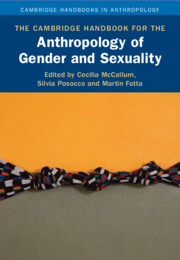Book contents
- The Cambridge Handbook for the Anthropology of Gender and Sexuality
- Cambridge Handbooks in Anthropology
- The Cambridge Handbook for the Anthropology of Gender and Sexuality
- Copyright page
- Contents
- Contributors
- 1 Introduction to The Cambridge Handbook for the Anthropology of Gender and Sexuality
- Part One Openings and Orientations
- Part Two Knowledges and Domains
- Part Three Resistances and Intersections
- 12 Social and Cultural Politics of Everyday Resistance and Empowerment
- 13 Reworking Black Feminist Anthropology through Transnational Scholar-Activism and Antiracist Solidarity in Africa and Its Diaspora
- 14 Gender in Decolonial Indigenous Perspectives
- 15 Anthropologies of Reproduction, Abortion, and Biopolitics
- 16 Gender, Capitalism, and the Erotics of Finance
- 17 Untying Poverty’s Gendered Knots Past and Present
- Part Four Desires and Relations
- Part Five Recursivities and Futures
- Name Index
- Subject Index
- References
13 - Reworking Black Feminist Anthropology through Transnational Scholar-Activism and Antiracist Solidarity in Africa and Its Diaspora
from Part Three - Resistances and Intersections
Published online by Cambridge University Press: 29 September 2023
- The Cambridge Handbook for the Anthropology of Gender and Sexuality
- Cambridge Handbooks in Anthropology
- The Cambridge Handbook for the Anthropology of Gender and Sexuality
- Copyright page
- Contents
- Contributors
- 1 Introduction to The Cambridge Handbook for the Anthropology of Gender and Sexuality
- Part One Openings and Orientations
- Part Two Knowledges and Domains
- Part Three Resistances and Intersections
- 12 Social and Cultural Politics of Everyday Resistance and Empowerment
- 13 Reworking Black Feminist Anthropology through Transnational Scholar-Activism and Antiracist Solidarity in Africa and Its Diaspora
- 14 Gender in Decolonial Indigenous Perspectives
- 15 Anthropologies of Reproduction, Abortion, and Biopolitics
- 16 Gender, Capitalism, and the Erotics of Finance
- 17 Untying Poverty’s Gendered Knots Past and Present
- Part Four Desires and Relations
- Part Five Recursivities and Futures
- Name Index
- Subject Index
- References
Summary
Black feminist anthropology has been and continues to be rooted in intellectual engagements with transnational Blackness, transnational feminism, queer politics, global anti-Blackness, anti-imperialism, and anticapitalism. Black feminist anthropology is a global endeavor that applies theory and lived experience to restructure ethnography and praxis that is engaged in an intersectional analysis of various oppressions and strategies for resistance, survival, and freedom. This chapter builds on those studies that identify the importance of including transnational Black feminism in the anthropological canon and supporting scholars who center Black women’s experiences throughout the diaspora. The aim is to encourage the use of a transnational Black feminist analytic to transform anthropological approaches to the study of Africa and its diaspora; constructions of labor, production, and reproduction; racialized identity formation; the performance of those identities across gender and sexuality; and narratives of oppression, resistance, and survival. The author centers transnational Black feminist frameworks that see the formation of diaspora as a site for solidarity that coalesce as a result of, around, and between women-led and gender-based political movements. For Black feminist anthropologists it names what was already possible, while providing an intentional epistemic framework and methodology for collaboration with Black feminists throughout Africa and its diaspora.
Keywords
- Type
- Chapter
- Information
- Publisher: Cambridge University PressPrint publication year: 2023



